Foster Consulting Internship Stories
In this story, we feature some members of the class of 2024 who interned in various consulting firms in different functions in 2023: Mridula Jonnalagadda (Alix Partners), Aashish Bhandari (BCG), Madison Roodman (Gartner) & Fanny Tavera (EY-Parthenon).
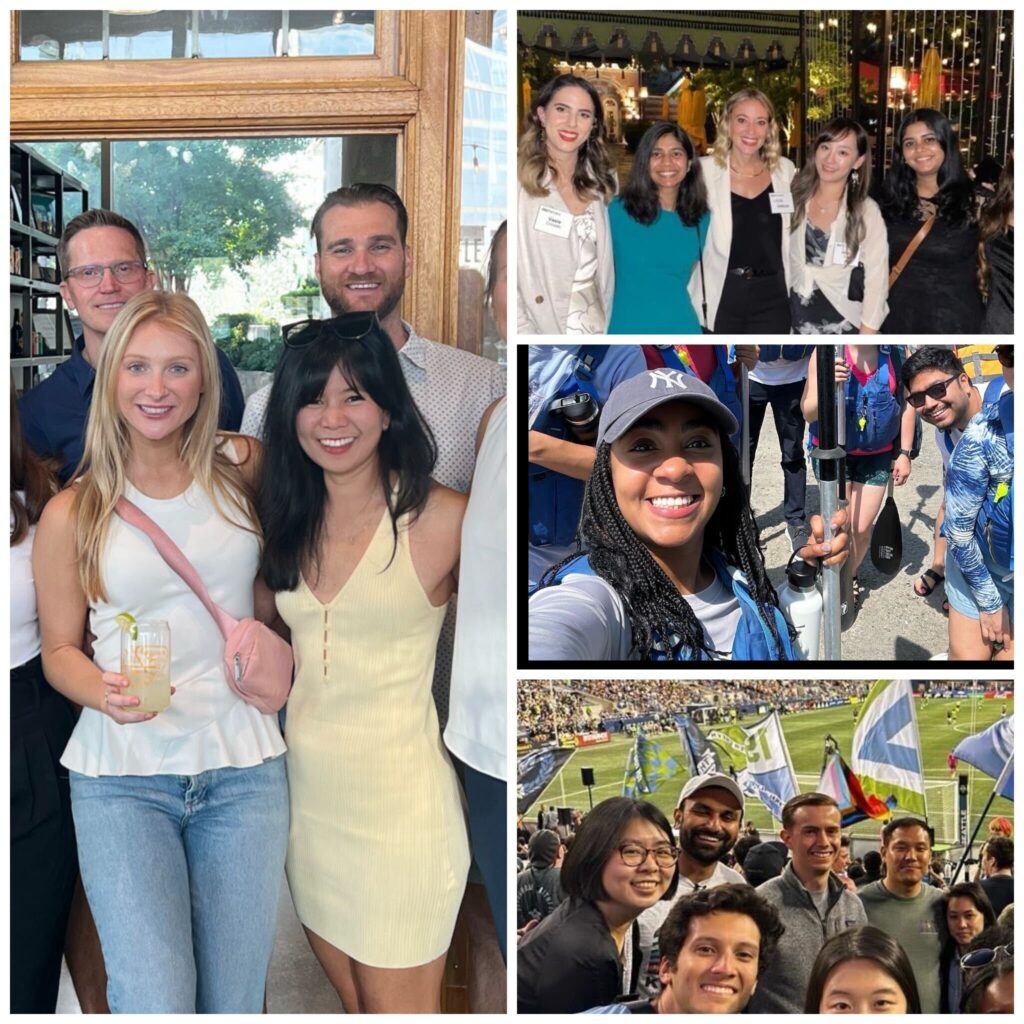
What was your pre-MBA professional and educational background?
Mridula: I worked in operations and supply chain for about 4 years at Amazon Logistics. I worked on ergonomic and process improvement projects across different fulfillment centers in the Midwest. In my 4th year, I worked as an operations manager leading a team of 200 associates and 6 managers in inbound operations. I was also very involved with diversity and inclusion culture at Amazon and led multiple affinity groups across my region. I did my undergraduate studies at Purdue University and earned a B.S. in Industrial Management.
Aashish: Most of my pre-MBA background was in various sales roles at Sartorius, a global supplier to the biopharma industry. During my time there, I grew my responsibilities from selling products used in research and development labs to the complex equipment used in multimillion-dollar drug manufacturing facilities. Before Sartorius, I started my career as a drug development research associate, which helped me grow the technical skills required to work with key decision-makers in the industry. I completed my undergraduate degree at the University of California, Davis studying Food Science Microbiology, with a minor in Business Management.
Madison: I attended the University of Washington for my undergraduate degree where I majored in Economics. Upon graduation, I accepted a full-time position with PepsiCo in the FritoLay division where I worked in business-to-business Sales Management for about two years. Then, I had a change of heart and wanted to work somewhere more mission-driven. I left PepsiCo for a role at UCLA Health, where I worked in the marketing department for about three years, focusing on patient recruitment and retention within the health system.
Fanny: I earned a degree in Hospitality from Cornell University’s School of Hotel Administration. Prior to business school, I worked in the food/beverage industry and hotels as a Project Manager Consultant. I worked primarily in small to medium-size organizations, where I had experiences such as opening restaurants in airports, spearheading a new division, driving digital transformation projects and managing multi-phase end to end restaurant projects.
Which industries did you target? And how was the internship search process?
Mridula: I was mostly focused on consulting. Fortunately for me, I was able to get an internship offer through early recruiting. I attended a pre-MBA conference, The Consortium’s Orientation Program, in June of 2022. I did a lot of networking and multiple coffee chats during the conference. That’s where I met and really connected with the AlixPartners team. After the conference, I applied online through their website. I did my interviews in August and received my offer shortly afterwards. I was really happy with the company and my offer, so my recruiting was essentially done before the program started.
Aashish: During the summer leading up to fall quarter, I reflected on what industries would be an ideal fit given my experience in sales/client management. I explored private wealth management and consulting. Consulting stood out to me as an area where I could apply the skills I’ve learned to address a variety of client needs while allowing me to explore new industries beyond healthcare. Foster has wonderful long-standing relationships with many consulting firms so most of the recruiting was facilitated by on-campus events! I did my best to attend all events hosted by firms I was interested in, contact alumni, and get leads for further coffee chats. Most of the consulting recruiting process is quite structured, with early fall focused on networking with firms, applications due around Thanksgiving, and interviews announced shortly after. I made sure to have Foster Consulting Society (FCS) coaches review my resume very early on so I could focus entirely on networking and casing practice before applications were due. As much as I could manage, I utilized all of the FCS resources: resume reviews, group cases, 1:1 cases, and behavioral prep. I only applied to consulting firms where I felt a strong fit and was able to secure an offer at BCG, where I just completed my summer internship.
Madison: When I entered business school, I still did not know what I wanted to be when I grew up – and I still don’t! This is what drew me to consulting, and in particular, the generalist model. The generalist model was attractive to me because it exposes you to various industries and business functions, so I did not have to choose! The internship process for me was intense. Classes were in full swing during the consulting recruitment season. The silver-lining is that I sharpened my time management skills during the first fall quarter of school as you need to balance company events, coffee chats, and interviews on top of your schoolwork.
Fanny: I actively participated in both The Consortium’s Orientation Program and the Forte MBA Women’s Leadership Conference, seizing the opportunity for early recruiting. Initially, I embarked on my recruiting journey with a focus on investment banking (IB). The world of IB proved to be intense, featuring an accelerated recruiting timeline heavily reliant on coffee chats. As I navigated this space, I quickly discerned my passion for both the quantitative and qualitative aspects of transactions. Consulting, I realized, was the space that seamlessly integrated both these dimensions.
Despite my primary background in hospitality, I saw business school as an opportunity to pivot. While uncertain about the exact trajectory, I was clear about certain aspirations. Autonomy to drive impactful initiatives and immersion in a dynamic environment surrounded by innovators, creators, and doers were non-negotiables for me. The prospect of creating from scratch, improving, or innovating resonated deeply.
Through numerous coffee chats and exploration, I found that consulting offered the foundational elements for a career aligned with my aspirations—a space where I could not only contribute but also be surrounded by individuals who shared my passion for innovation and creation.
Which MBA Career Management (CM) events, programs, or services did you find most helpful?
Mridula: CM does an excellent job of helping us prepare our resumes and elevator pitches before these pre-MBA conferences. The resume handbook that CM provides with sample resumes catering to different industries was very informative. I especially found doing a mock interview with my career coach, Stacy Duhon, to be extremely helpful before attending the conference. She helped me be more succinct and less jargon-y in my responses. The Peter K Webinars were also helpful in understanding what case interviews are and what type of questions to expect.
Aashish: I utilized CM for both resume reviews and behavioral interview preparation! They recommended emphasizing skills that showcased my ability to work in a fast-paced client environment, choosing better action words, and adjusting the order of bullets to tell a stronger story.
Fanny: I found working with CM 1:1 was extremely helpful, especially while gearing up for the pre-MBA conferences. I worked closely with Leslie to ensure my stories aligned with my resume and the industry/position I was recruiting for.
How was your overall internship structured, and what were the major deliverables?
Mridula: The duration of my internship was 10 weeks. We did an orientation program for the first week in the Detroit office. We were the biggest internship class in the history of the internship program- there were 40 of us. During our first week, we did Q&A sessions with partners from each industry AlixPartners caters to and we did a bunch of social activities (bowling, cruises, etc.) to get to know each other.
We spent the next 8 weeks with our project teams. Each of us was assigned to a project team in an industry that we chose. Typically, there were two interns assigned to each project team. This part of the internship was largely unstructured and totally depended on the phase of the project as well as what the client needs. My project was in an implementation phase where we were helping the client implement a new sales operating model that we recommended. The final week was spent in the NYC office where we did our final presentations, more networking, and some social events.
My final deliverable was split into three parts:
- Final presentation to internship coordinator and project team.
- Excel spreadsheet showing target sales headcount and cost savings for each region the company serves in the USA and Canada.
- PowerPoint deck highlighting compensation and incentive plan for new operating model.
There were several social events scattered throughout the internship. The entire intern class worked from the Chicago office for two weeks and we had social events planned in the evening. We did the Chicago architectural tour, a rooftop social and a cooking class.
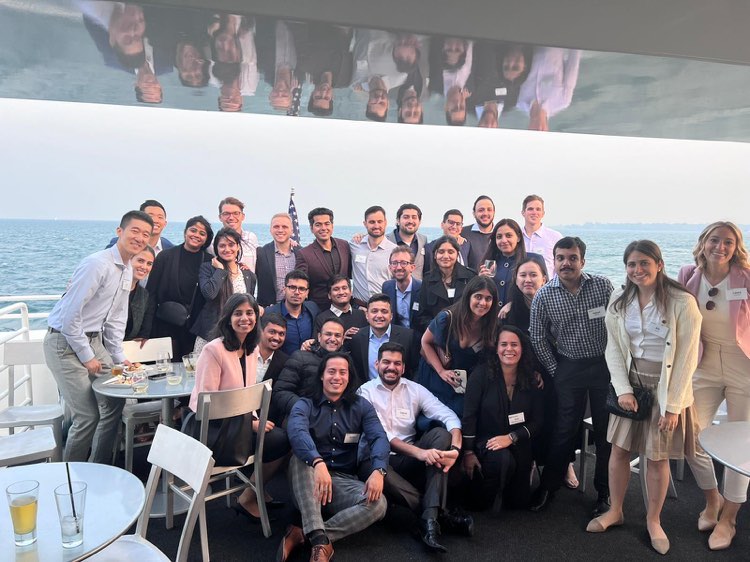
Aashish: I interned at the BCG Seattle office which ran for 10 weeks. My project took up the duration of my internship which allowed me to ramp up along with the rest of my team, a huge benefit. We worked on a pricing improvement case for an industrial goods company, uncovering where they could strategically raise product pricing without affecting volume. A big part of my deliverables involved classifying thousands of customers into a few core segments with unique pricing strategies, reducing the amount of variability in pricing across similar customer types. I had an amazing experience this summer and my team always pushed me to be the best version of myself!
Madison: Similar to other internships, including non-consulting internships, my main deliverable was a final presentation to my manager, cohort of interns, and some executive leadership. This presentation was focused on summarizing the impact of my work in the 8 weeks of my internship. For the day-to-day, I was assigned to three different workstreams all rolling up to one large, overarching project for one client. These daily tasks and deliverables could include developing slides, mapping out process flows, and some spreadsheet analyses.
Fanny: I completed my internship with EY-Parthenon as part of the Strategy & Transactions team, spending a rewarding 10 weeks at the NYC office. The journey kicked off with a week of comprehensive training before we delved into our respective projects. Notably, the company observes a week-long summer break around July 4th, providing a ‘pencils down’ environment for all employees, except for certain critical projects that required immediate attention. During this week off, I traveled to San Juan, Puerto Rico!
During my internship, I played a crucial role in supporting seven sub-sales workstreams for the Kellogg spinoff. This involved managing cutover activities such as customer data migration, asset transfer, and workforce transition. I took charge of leading weekly summary reporting for sales leadership, addressing vital separation issues, and defining post-transaction service agreements to safeguard client interests. Concurrently, I volunteered with the Entrepreneurship Access Network at EY, focusing on sourcing and outreach to fellow Latino founders for EY’s accelerator program.
Throughout the summer, numerous events added to the experience, from boat cruises to opportunities to engage with senior leaders across divisions and industries. The individuals I encountered truly embodied EY-Parthenon’s core values—smart, nice, and driven!
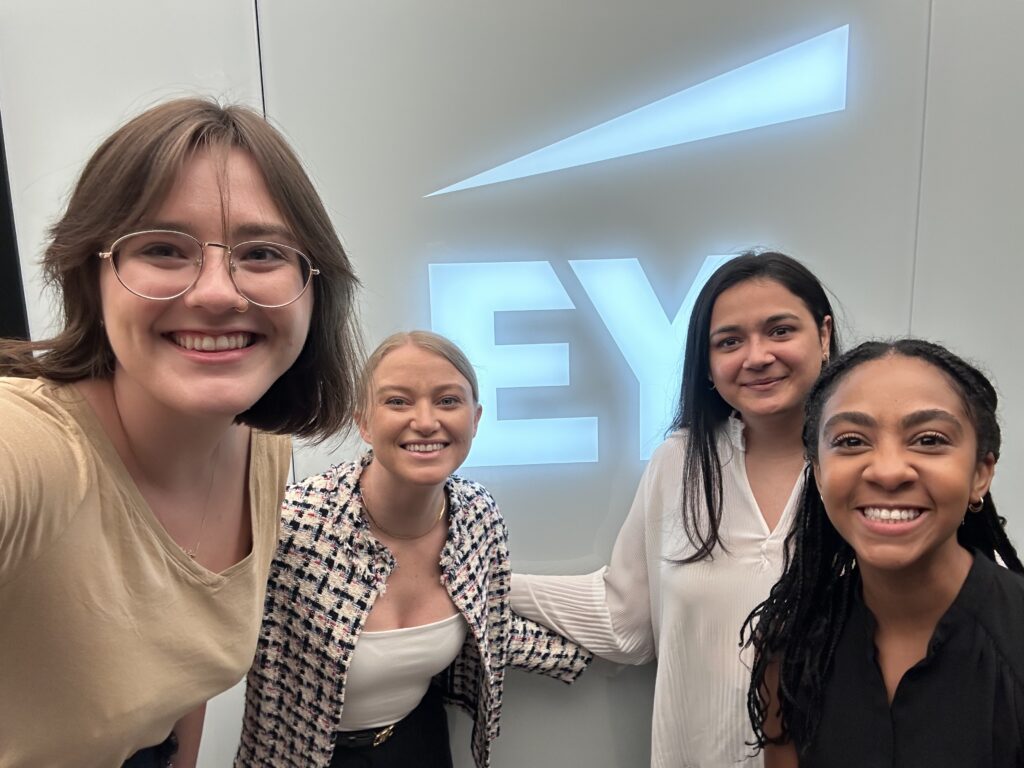
Please tell us about some of the challenges you faced and skills you acquired.
Mridula: The first few weeks were very intense as I was trying to learn the company’s tools, learn about the client and was getting to know the team. I was working extremely long hours and some weekends to get ramped up quickly and move up the learning curve. I learned a lot from the internship. Some of my key takeaways are:
- Build clean and fairly simple excel spreadsheets/models that can be easily modified and understood by others. Projects move hands from one consultant to another very frequently sometimes and we can’t spend too much time deciphering excels/ppts.
- Know your audience – we talk to clients from different levels of the organization daily. Some are in the project managers and in the weeds of things and some are C-suite executives. Tailor the message in a way that the audience understands the purpose of the message and the appropriate level of detail is provided.
- Always make time for coffee chats. This is the best way to understand the culture of the org and the projects being done in different industries.
Aashish: Pricing is a quant-heavy practice area and the large transaction datasets we worked with required learning how to effectively manipulate data outside of Excel and visualize it to tell a story. I had to quickly learn how to use Alteryx, a data science program, and Tableau, despite having zero experience with them prior to BCG. Thankfully, we have a huge pool of resources from peers to dedicated coaches who can assist on some of the more challenging topics!
Fanny: When I joined, the transaction was already well underway, making the first two weeks perhaps the most challenging. I dedicated my efforts to catching up on our project, understanding the client, and familiarizing myself with our goals and deliverables in the upcoming weeks. Moreover, I had to learn how to use two in-house tools for PPT and Excel, which required some time. Despite these challenges, I consistently felt supported by my team, the Employee Resource Groups (ERGs), and the firm as a whole.
How would you describe the culture of the organization? Did you have good mentors? Did you meet colleagues or other MBA students from peer schools you plan to stay in touch with post internship?
Mridula: The culture is very fast-paced but everyone is very friendly and supportive. The firm is good at accepting feedback and making changes quickly. I had amazing mentors who were very involved in my development and were very helpful. They invested a lot of time in making me feel supported and providing resources when I asked. With the internship cohort being so large, it felt like a mini summer MBA program. The orientation and social activities really brought us very close to each other. I plan on staying in touch with a lot of folks.
Aashish: A big part of my positive summer experience was the culture at BCG. Interns are actively expected to contribute, especially when it comes to clients! On my first day at the client site, I got to speak with the CEO, discuss the challenges they were facing, and how the project would help accelerate progress for the entire organization. My mentors were actively involved in my professional development, and I knew I could go to them with any challenges I was facing. One of my favorite parts of the summer was hanging out with the other MBA interns! BCG facilitates a lot of summer social events and we also made time on the weekends to get to know each other better! I’m excited to return next year with the others as full-fledged consultants.
Any particularly memorable experience from your internship?
Mridula: There were a lot of memorable experiences! The highlights for me were meeting my project team in person after working with them remotely for a month. It was really nice to work with them in person and get to know them outside of work. Any time spent with the other interns was very memorable. We got to explore Chicago and NYC together. Presenting my final deliverable to the client and getting their reaction was very rewarding as I feel like I contributed something meaningful for their team.
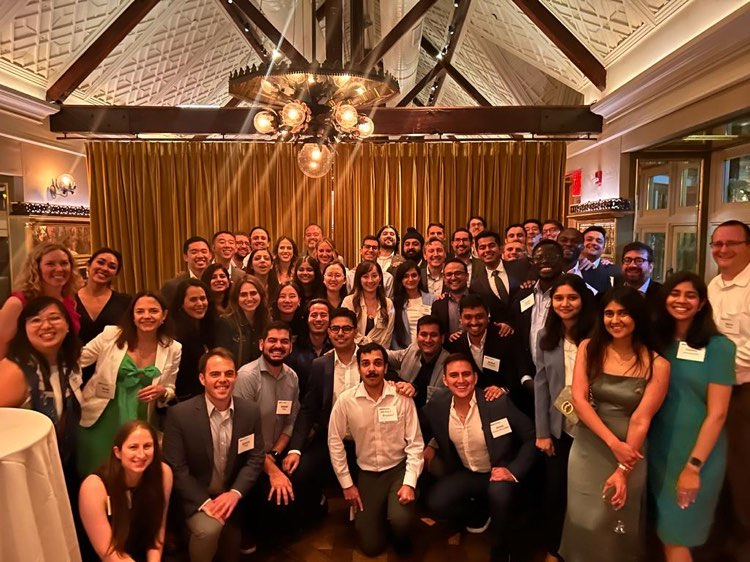
Aashish: My favorite event was the BCG Summer Retreat. The office booked Suncadia Resort for an entire weekend, and the whole office was invited! Everyone was allowed to bring their partner and/or kids, which really speaks to the inclusive dynamic that BCG has fostered. The office team had plenty of events organized – hikes, water activities, and mixers. The other interns and I dressed up in our favorite camping attire and took part in a costume contest! Given how hard everyone works, it was nice to have dedicated time to relax and rejuvenate.
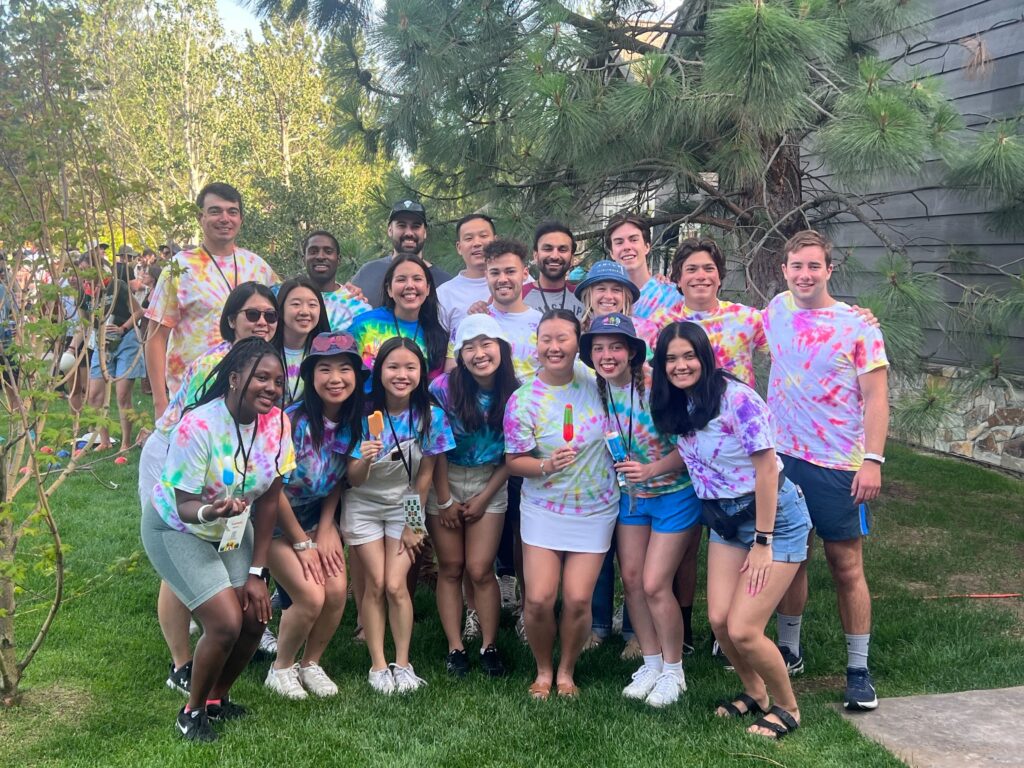
Did you have vacation time to enjoy the Seattle summer? How did you enjoy your recreational time? (E.g., trips, hikes, concerts etc.)
Mridula: I have almost a month and a half of free time which is amazing. I’m spending the first few weeks in Dallas with my family. I plan to go on hikes, camping trips, and make the most of the Seattle summer! I might do some small weekend trips to Vancouver/Portland/Leavenworth.
Aashish: I tried to do a little bit of everything this summer. Weekends were reserved for hosting friends from out of town, hanging out with other interns, or traveling. I had some of the best food of my life at Sushi Suzuki in Seattle this summer and I got to see Drake while he was touring on my last day of internship! Post-internship, I traveled to Buenos Aires, Peru, Mexico City, and Cabo!
Madison: I personally don’t think there is any better place on earth to spend summer than the Pacific Northwest! So with that in mind, I made it a point to stay in town throughout the summer, despite my internship being fully remote. I enjoyed walks around greenlake, trying out new restaurants, and getting out on Lake Washington any chance I got. Seeing Taylor Swift at CenturyLink Field was also a highlight!
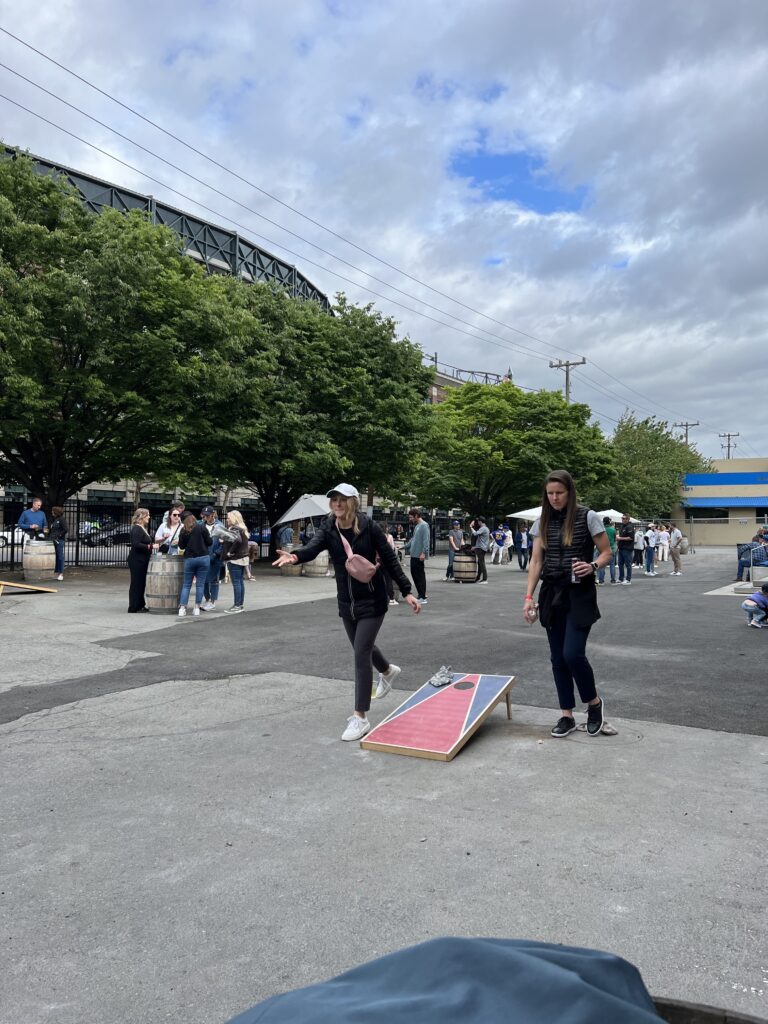
Fanny: I had such an unforgettable experience this summer. I had the opportunity to be back home in NYC – working on a great team and project, living at home, and spending time with family and friends! I walked everywhere, averaging about 10k steps, from 34th St and 9th Ave in Manhattan over the Williamsburg bridge into Brooklyn at least 4x. I tried new restaurants and rooftops, attended summer concerts and broadway shows, and more! Post internship, I traveled to the Dominican Republic, Seoul, Kyoto and Tokyo.
What are your plans for the second year?
Aashish: I’m excited to be a part of FCS along with my co-president Hannah Ewing-Kally! FCS was such a pivotal part of our recruiting journey that we wanted to be involved and guide other students interested in consulting. Our board is comprised of students from various backgrounds and summer internships, and we’ve had such an amazing turnout of case coaches this year! I’m confident we can cater to the needs of the Class of 2025 and give them the best chance of success. Once consulting recruiting wraps up in January, I’ll be headed to Cape Town, South Africa for a quarter-long exchange program!
Fanny: Second year is on! Although I miss NYC, I am truly excited to be back on campus and look forward to being intentional about my last year of b-school! On the horizon: academics, leading the MBAA (student association), working with my amazing classmates as a member of the Finance Society and the Entrepreneurship & Venture Capital club, an independent study project, study abroad in Rotterdam winter quarter, and more!
What advice do you have for first year students regarding summer internships?
Mridula: Be open-minded and enthusiastic for all opportunities coming your way. Some of the work I did was not what I expected an MBA intern to be doing but at the same time, it totally depends on business needs so be open to the fact that you might not always be doing the high level strategic type of work that you expected. Make time for coffee chats and getting to know your peers during the internship. It will help a lot to get through the internship and you will have a small network of people you know when you return.
Aashish: Prioritize, prioritize, prioritize! It’s impossible to do everything your first year without burning out so I would encourage students to sit down and figure out what they are really interested in! Once you have a few industries in mind, make sure you work on your resume and story to match that outcome. It’s really important to craft a compelling journey from MBA student to eventual employee at Company X. Interviewers shouldn’t have to jump through hoops to imagine you working there!
Madison: Summer internships go by FAST. Eight, ten, twelve weeks will go by in the blink of an eye and you (typically) only get one summer internship, so it is important to prepare to make the most of your time there. My advice would be to get through your onboarding process as efficiently as you can, so you can begin using your time at the company in a more meaningful way. At Gartner, individuals are extremely receptive to meeting new people through coffee chats. If the culture at your place of summer internship is open to coffee chats with individuals new to the organization, I would recommend utilizing any free time you have to get to know different people and their work. It will help you better evaluate if this is the right fit for you in the long term, and the networking can help if you return full-time to know where you would like to be staffed.
Fanny: Be intentional about your goals. While it’s okay to explore options, make decisions on your priorities. Recruiting moves swiftly and demands preparation. The sooner you outline your recruiting priorities, the quicker you can craft your resume and stories.
